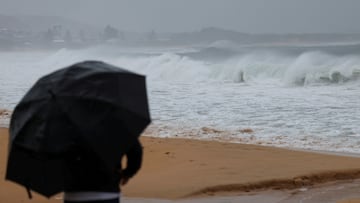Tropical storm in Florida: the most common beach mistakes that can put you in danger
East coast residents urged to prepare as Chantal nears landfall; emergency tips shared for staying safe before, during, and after the storm.


Although the Carolinas are expected to be hardest hit by Tropical Storm Chantal, which is due to make landfall on Saturday evening and last through Sunday morning, beaches on Florida’s east coast are also bracing themselves for particularly heavy rain and thunderstorms.
With that in mind, PuroClean, a property restoration company in Pompano Beach, just north of Fort Lauderdale, has issued a handy reminder about best practices for preparing for hurricanes.
Although Tropical Storm Chantal isn’t expected to reach hurricane levels, it is believed some gusts of wind could approach hurricane strength (Category 1 hurricanes have wind speeds of between 74 and 95mph).
Given the business PuroClean is in, there are plenty of property-related tips, along with general advice about how to stay out of trouble. The full list for how to act before, during, and after the event can be found here.
Preparing for a hurricane or storm: the basics
Some recommendations are based on common mistakes that end up putting people in harm’s way when the weather turns rough.
The basics include knowing how likely your area is to succumb to flooding and learning hurricane evacuation routes. Creating an evacuation plan for your family, including a designated meeting place and means of getting in touch if you get separated, are also considered essential.
FEMA emergency kit
Also make sure you have an emergency kit ready to go. According to FEMA (the Federal Emergency Management Agency), that should include:
- Water (one gallon per person per day for at least three days)
- Non-perishable food for at least three days
- Hand crank or battery-powered radio (tuned in to NOAA Weather Radio), as well as spare batteries
- Flashlight with extra batteries
- First aid kit
- Whistle to call for help
- Dust mask (to filter contaminated air)
- Plastic sheeting (for shelter making)
- Duct tape
- Moist towelettes and garbage bags for sanitation
- Pliers or wrench to turn off utilities
- Can opener
- Local maps
- Cell phone with an extra charger
Storm-proofing your house can save your life
As for the property-related advice, although it could ultimately save your life.
That includes securing your roof and windows, and caulking (waterproofing/sealing) your house, particularly if you’re likely to be home. A water barrier supported by sandbags at least two feet high can also stop water from entering.
Practical advice for surviving a storm
When you know a bad storm is coming, charge your phone in advance, and fill up your gas tank in case you need to make a quick getaway.
🌀 #TD3 has been upgraded to Tropical Storm #Chantal, as max winds have increased to about 45 mph as measured by @53rdWRS hurricane hunter aircraft.
— Dr. Levi Cowan (@TropicalTidbits) July 5, 2025
🌀 These winds, along with the heaviest rains, are confined to the northeast side of Chantal's circulation due to persistent wind… pic.twitter.com/u1oGaySNnx
Speaking of getting away, leave your home immediately if told to do so by the authorities, strictly following posted evacuation routes (with your emergency kit, of course). Any attempts to deviate from that route could lead - and have led - to trouble.
Although it probably goes without saying, get indoors as soon as possible if you aren’t already, and stay away from windows, skylights, and glass doors once you get there. If, however, your home is on low-lying ground and is prone to flooding, move to higher ground as soon as you can (even if that means an upper floor). And if and when lightning hits, refrain from using the shower, phone, or electrical equipment.
Eating and drinking after the storm
Once the worst of it is over, it’s also important to keep your wits about you. That means not walking or driving down flooded roads, not entering damaged buildings, and not touching wet electrical equipment.
Food that has been exposed to floodwater should be thrown out, while tap water may not be drinkable, so check with someone in the know before drinking.
Get your game on! Whether you’re into NFL touchdowns, NBA buzzer-beaters, world-class soccer goals, or MLB home runs, our app has it all.
Dive into live coverage, expert insights, breaking news, exclusive videos, and more – plus, stay updated on the latest in current affairs and entertainment. Download now for all-access coverage, right at your fingertips – anytime, anywhere.
Complete your personal details to comment